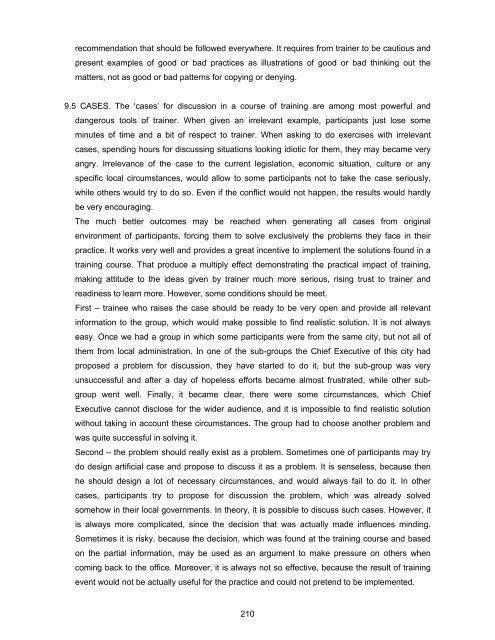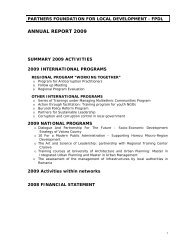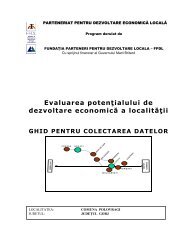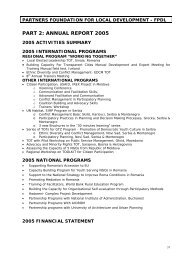Organizational Development: A Manual for Managers and ... - FPDL
Organizational Development: A Manual for Managers and ... - FPDL
Organizational Development: A Manual for Managers and ... - FPDL
You also want an ePaper? Increase the reach of your titles
YUMPU automatically turns print PDFs into web optimized ePapers that Google loves.
ecommendation that should be followed everywhere. It requires from trainer to be cautious <strong>and</strong><br />
present examples of good or bad practices as illustrations of good or bad thinking out the<br />
matters, not as good or bad patterns <strong>for</strong> copying or denying.<br />
9.5 CASES. The ‘cases’ <strong>for</strong> discussion in a course of training are among most powerful <strong>and</strong><br />
dangerous tools of trainer. When given an irrelevant example, participants just lose some<br />
minutes of time <strong>and</strong> a bit of respect to trainer. When asking to do exercises with irrelevant<br />
cases, spending hours <strong>for</strong> discussing situations looking idiotic <strong>for</strong> them, they may became very<br />
angry. Irrelevance of the case to the current legislation, economic situation, culture or any<br />
specific local circumstances, would allow to some participants not to take the case seriously,<br />
while others would try to do so. Even if the conflict would not happen, the results would hardly<br />
be very encouraging.<br />
The much better outcomes may be reached when generating all cases from original<br />
environment of participants, <strong>for</strong>cing them to solve exclusively the problems they face in their<br />
practice. It works very well <strong>and</strong> provides a great incentive to implement the solutions found in a<br />
training course. That produce a multiply effect demonstrating the practical impact of training,<br />
making attitude to the ideas given by trainer much more serious, rising trust to trainer <strong>and</strong><br />
readiness to learn more. However, some conditions should be meet.<br />
First – trainee who raises the case should be ready to be very open <strong>and</strong> provide all relevant<br />
in<strong>for</strong>mation to the group, which would make possible to find realistic solution. It is not always<br />
easy. Once we had a group in which some participants were from the same city, but not all of<br />
them from local administration. In one of the sub-groups the Chief Executive of this city had<br />
proposed a problem <strong>for</strong> discussion, they have started to do it, but the sub-group was very<br />
unsuccessful <strong>and</strong> after a day of hopeless ef<strong>for</strong>ts became almost frustrated, while other subgroup<br />
went well. Finally, it became clear, there were some circumstances, which Chief<br />
Executive cannot disclose <strong>for</strong> the wider audience, <strong>and</strong> it is impossible to find realistic solution<br />
without taking in account these circumstances. The group had to choose another problem <strong>and</strong><br />
was quite successful in solving it.<br />
Second – the problem should really exist as a problem. Sometimes one of participants may try<br />
do design artificial case <strong>and</strong> propose to discuss it as a problem. It is senseless, because then<br />
he should design a lot of necessary circumstances, <strong>and</strong> would always fail to do it. In other<br />
cases, participants try to propose <strong>for</strong> discussion the problem, which was already solved<br />
somehow in their local governments. In theory, it is possible to discuss such cases. However, it<br />
is always more complicated, since the decision that was actually made influences minding.<br />
Sometimes it is risky, because the decision, which was found at the training course <strong>and</strong> based<br />
on the partial in<strong>for</strong>mation, may be used as an argument to make pressure on others when<br />
coming back to the office. Moreover, it is always not so effective, because the result of training<br />
event would not be actually useful <strong>for</strong> the practice <strong>and</strong> could not pretend to be implemented.<br />
210
















